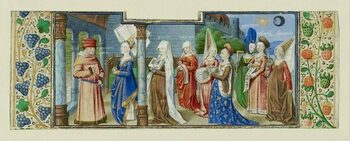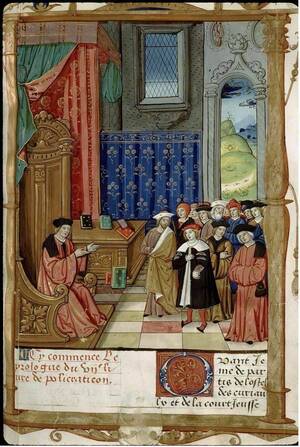From the Medieval Research Blog: "Poetry as a Quadrivial Art?"

“That ‘Poetry is the cradle of philosophy’ is axiomatic”
(John of Salisbury, Metalogicon I.22).
It is a truth generally acknowledged that in the Middle Ages a liberal arts education consisted of the trivium (grammar, logic, and rhetoric) and the quadrivium (arithmetic, music, geometry, astronomy). Poetry –what we might call “literature”– was primarily taught by grammarians and rhetoricians in the Middle Ages. Literary scholars, like Rita Copeland and Marjorie Woods, have therefore been very motivated to study exactly what the language disciplines of Grammar and Rhetoric entailed and precisely how they were taught in order to have a better sense of what the study of literature must have looked like in this period. Their works are indispensable for the study of medieval literature and truly are the bulk of where instruction in poetics lay in the Middle Ages. And yet, once cannot stop there.

Knowing exactly where to put poetry was something that clearly bothered many medieval philosophers. While today we might assume that poetry would clearly be associated with the Trivium, or the arts dedicated to words, specifically grammar and rhetoric, certain medieval thinkers located it within logic and also the Quadrivium, or the arts of number. Understanding why can help us to understand the multi-faceted way in which the medieval mind approached poetry in particular and the literary arts more generally.
In the twelfth century when there were major curricular changes afoot in schools and universities, John of Salisbury maintained that poetry belonged to the art of grammar although it was closely allied with rhetoric. “Art,” writes John of Salisbury, “is a system that reason has devised in order to expedite, by its own short cut, our ability to do things within our natural capacities. Reason neither provides nor professes to provide the accomplishment of the impossible;” Instead, reason pursues the possible by means of an efficient plan, what the Greeks would call a methodon (Metalogicon I.11, p.33).
This is an excerpt from "Poetry as a Quadrivial Art?" by Dr. Lesley-Anne Dyer Williams. Read the full story.
Originally published by at medieval.nd.edu on September 11, 2024.
Latest Research
- University of Notre Dame and IBM Research build tools for AI governanceMain Building (Photo by Matt Cashore/University of Notre Dame) …
- Smarter tools for policymakers: Notre Dame researchers target urban carbon emissions, building by buildingCarbon emissions continue to increase at record levels, fueling climate instability and worsening air quality conditions for billions in cities worldwide. Yet despite global commitments to carbon neutrality, urban policymakers still struggle to implement effective mitigation strategies at the city scale. Now, researchers at Notre Dame’s School of Architecture, the College of Engineering and the Lucy Family Institute for Data & Society are working to reduce carbon emissions through advanced simulations and a novel artificial intelligence-driven tool, EcoSphere.
- Seven engineering faculty named collegiate professorsSeven faculty members in the Notre Dame College of Engineering have been named collegiate professors—a prestigious title awarded by the university and college in recognition of excellence in research, teaching and service. The designation may be conferred on faculty at the assistant, associate or…
- ‘A special challenge’: German studies scholar wins National Humanities Center fellowship for research on medieval womenFor CJ Jones, the joy of research is not the answers but the journey. And the next step on that journey is a fellowship with the National Humanities Center. …
- Notre Dame Lead Innovation Team partners with local WIC program to identify, prevent lead poisoning in childrenB.A.B.E. store “shoppers” now have something new to help their families: free lead screening kits offered by the University of Notre Dame’s Lead Innovation Team.
- Notre Dame Welcomes Ninth Cohort of Warrior-Scholars for Transformative Academic JourneyNOTRE DAME, IN – The University of Notre Dame recently concluded its ninth successful Warrior-Scholar Project (WSP) boot camp, hosting 34 dedicated Warrior-Scholars from June 21st to 28th. This intensive, week-long academic residency provided transitioning service members and veterans…













